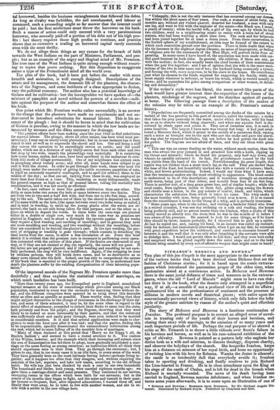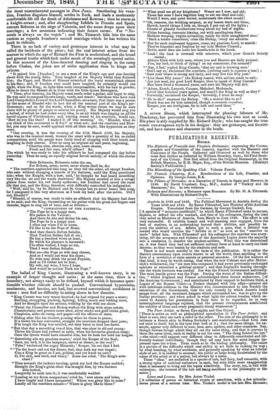TITMARSH'S REBECCA AND ROWENA. * THE plan of this jeu d'esprit
is the most appropriate to the season of any of the various books that have been devised since Dickens first set the fashion of Christmas stories ; for it is based upon the comic extrava- ganza which introduced the pantomime proper of the olden time, when pantomime aimed at a continuous action. In Rebecca and Rowena there is the same jovial defiance of times and manners as in the extrava- ganza, where the old " Lord of Misrule" might seem to have run riot; but there is in the book, what the theatre only attempted in a superficial way, if at all,—a sensible if not a profound view of life and its affairs ; goodnatured hits at the predominance of sentiment and the presence of silliness in modern novels and theatrical pieces ; with satire upon the conventionally perverted views of history, which only falls below the lofty style of the greater satirists by reason of the author's quiet and effortless jocularity. The story of Rebecca and Rowena is a facetious continuation of Ivanhoe. The professed purpose is to correct an alleged error of novel- ists in treating only of the youth of their heroes and heroines, and closing their story with marriage, to the omission of so many years and such important periods of life. Perhaps the real purpose of so shrewd a critic as Mr. Titmarsh is to throw a little ridicule over Scott's failure in his heroines and heroes, as well as in his rose-coloured exhibition of the age of chivalry. Rowena is painted as a pattern lady who neglects her duties both as a wife and mistress, to discuss theology, dispense charity, and observe the holydays of the church. She henpecks Ivanhoe, keeps him at a distance on account of her royal birth, and loses no opportunity of twitting him with his love for Rebecca. Wamba the Jester is silenced ; the castle is so intolerably dull that everybody avoids it; Ivanhoe takes to sporting and drinking, and finally resolves to join Richard the Lion-hearted in France. He is in close attendance upon the King at his siege of the castle of Chains, and is left for dead in the breach when Richard is mortally wounded. The news of his death having been carried to England, Rowena marries Athelstane; and when Ivanhoe re- turns some years afterwards, it is to come upon an illustration of one of * Rebecca and Rowena : Romance upon Romance. By Mr. Michael Angelo Tit-
marsh. Illustrated by Richard Doyle. Published by Chapman and Hall.
the most unsentimental passages in Dan. Juan. Smothering his vexa- tion, Ivanhoe disguises himself, settles in York, and leads a moderately comfortable life till the death of Athelstane and Rowena ; then he starts as a knight-errant ; and, after slaughtering Infidels in Prussia and Spain, rescues Rebecca at the siege of Valencia, and the scene drops upon their marriage; a few sentences indicating their future career. For "Ne- mesis is always on the watch " ; and Mr. Titmarsh falls into the same custom as regards Ivanhoe's second marriage which he has written his book to ridicule.
There is no lack of variety and grotesque interest in what may be called the incidents of the piece ; but the real interest arises from the manner in which the age of Richard the First is modernized, and the broad and general truths which lurk under much of the seemingly special satire. In this account of the Lion-hearted dancing and singing in the camp before Challis, the jokes are of wider application than to kings and princes.
" It pained him [Ivanhoe] to see a man of the King's age and size dancing about with the young folks. They laughed at his Majesty whilst they flattered him; the Pages and Maids of Honour mimicked the royal mountebank almost to his face; and, if Ivanhoe ever could have laughed, he certainly would one night, when the King, in light-blue satin inexpreesibles, with his hair in powder, apse to dance the Minuet de is Cour with the little Queen Berengaria. " Then, after dancing, his Majesty must needs order a guitar, and begin to sing. He was said to compose his own songs, words, and music: but those who have read Lord Campobello's Lives of the Lord Chancellors are aware, that there was a person by the name of Blondel who in fact did all the musical part of the King's per- formances; and as for the words, when a King writes verses we may be sure there will be plenty of people to admire his poetry. His Majesty would sing you a ballad, of which he had stolen every idea, to an air which was ringing on all the barrel-organs of Christendom; and, turning round to his courtiers, would say, 'How do you like that? I dashed it off this morning.' Or, 'Blondel, what do you think of this movement in B flat?' or what not; and the courtiers and Blon- del, you may be sure, would applaud with all their might, like hypocrites as they were.
"One evening, it was the evening of the 27th March 1199, his Majesty, who was in the musical mood, treated the court with a quantity of his so-called compositions, until the people were fairly tired of clapping with their hands and laughing in their sleeves. First he sang an original air and poem, beginning,
"Cherries nice, cherries nice, nice, come choose, Fresh and fair ones, who'll refuse? &c.
The which he was ready to take his affidavit he had composed the day before yesterday. Then he sang an equally original heroic melody, of which the chorus VW,
"Rule Britannia, Britannia rules the sea, For Britons, never, never, never slaves shall be, &c.
" The courtiers applauded this song as they did the other, all except Ivanhoe, who sate without changing a muscle of his features, until the King questioned him; when the Knight, with a bow, said, he thought he had heard something very like the air and the words elsewhere.' His Majesty scowled at him a savage glance from under his red bushy eyebrows; but Ivanhoe had saved the royal life that day, and the King, therefore, with difficulty controlled his indignation. " Well,' said he, by St. Richard and St. George but ye never heard this song I for I composed it this very afternoon as I took my bath after the melee. Did not, Blondel?'
"Blondel, of course, was ready to take an affidavit that his Majesty had done as he said; and the King, thrumming on his guitar with his great red fingers and thumbs, began to sing out of tune, and as follows- ' COaLAIANDERS OF THE FAITHFUL
"The Pope he is a happy man, His palace is the Vatican: And there he sits and drains his can, The Pope he is a happy man. I often say when I'm at home, I'd like to be the Pope of Rome.
"And then there's Sultan Saladin, That Turkish Soldan full of sin ; He has a hundred wives at least, By which his pleasure is increased: I've often wished, I hope no sin, That I were Sultan Saladin.
"But no—the Pope no wife may choose, And so I would not wear his shoes; No wine may drink the proud Paynim, And so I'd rather not be him; My wife, my wine, I love I hope, And would be neither Turk nor Pope."
The ballad of King Canute, illustrating a well-known story, is an example of deeper thought and satire : at the same time, there is a boundary, not always easily to be defined, beyond which it becomes ques- tionable whether ridicule should be pushed. Conventional hypocrisies, sentiments, and heroics, are bad, but avowed conventional sordidness is
worse : men find no difficulty in acting down to low theories. "King Canute was very weary-hearted; be had reigned for years a score; Battling, struggling, pushing, fighting, killing much and robbing more, And he thought upon his actions, walking by the wild sea-shore. "'Twist the Chancellor and Bishop walked the King with steps sedate, Chamberlains and grooms cams after, silver sticks and gold sticks great, Chaplains, aides-de-camp, and pages—all the officers of state. " Sliding after like his shadow, pausing when he chose to pause' - If a frown his face contracted, straight the courtiers dropped their jaws; If to laugh the King was minded, out they burst in loud hee-haws. "But that day a something vexed him, that was clear to old and young: Thrice his Grace bad yawned at table, when his favourite gleeman sung; Once the Queen would have consoled him, but he bade her hold her tongue. "'Something ails my gracious master,' cried the Keeper of the Seal; 'Sure, my lord, it is the lampreys, served at dinner, or the veal!' Pahl: exclaimed the angry Monarch;' Keeper, 'tis not that I feel. ""Tis the heart and not the dinner, fool, that doth my rest impair; Can a King be great as I am, prithee, and yet know no care? 0, Pm sick, and tired, and weary.' Some one cried, ' The King's arm- chair I' "Then towards the lackeys turning, quick my lord the Keeper nodded; Straight the King's great chair was brought him, by two footmen able-bodied,
Languidly he sank into it; it was comfortably wadded.
"' Leading on my fierce companions; cried he, over storm and brine,
I have fought and I have conquered ! Where was glory like to mine!' Loudly all the courtiers echoed—' Where is glory like to thine
"' What avail me all my kingdoms? Weary am I now, and old;
Those fair sons I have begotten long to see me dead and cold;
Would I were, and quiet buried, underneath the silent mould!
" Oh, remorse, the writhing serpent, at my bosom tears and bites; Horrid, horrid things I look on, though 1 put out all the lights; Ghosts of ghastly recollections troop about my bed of nights.
"' Cities burning, convents blazing, red with sacrilegious fires; Mothers weeping, virgins screaming, vainly for their slaughtred sires.' ' Such a tender conscience,' cries the Bishop, ' every one admires.
"But for such unpleasant bygones, cease, my gracious Lord, to search:
They're forgotten and forgiven by our holy Mother Church ; Never, never does she leave her benefactors in the lurch.
" Look I the land is crowned with minters, which your Grace's bounty
raised ; Abbeys filled with holy men, where you and Heaven are daily praised:
You, my lord, to think of dying? on my conscience, I'm amazed!'
"'Nay, I feel,' replied King Canute, that my end is drawing near.' 'Don't say so,' exclaimed the courtiers, (striving each to squeeze a tear) ;
Sure your Grace is strong and lusty, and may live this fifty year.'
"'Live these fifty years!' the Bishop roared, with actions made to suit; Are you mad, my good Lord Keeper, thus to speak of King Canute? Men have lived a thousand years, and sure his Majesty will do't.
"'Adam, Enoch, Lamech, Canaan, Mahaleel, Methusela, Lived nine hundred years apiece, and mayn't the King as well as they ?' ' Fervently,' exclaimed the Keeper, ' fervently, I trust he may.'
"He to die?' resumed the Bishop. 'He a mortal like to us? Death was not for him intended, though communis omnibus; Keeper, you are irreligious, for to talk and cavil thus.'" • • • • • • • A severe illness, which interrupted the pleasing labours of Mr. Thackeray, has prevented him from illustrating his own text as usual. His place is ably supplied by Mr. Richard Doyle; who has caught the true comic extravaganza style in his designs they are grotesque, not theatri- cal, and have nature and character in the heads.



























 Previous page
Previous page